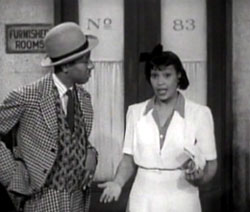 To the musical arrangement on the soundtrack, we watch Edna Mae Harris (best remembered as Zeba the jazz gal in Green Pastures, 1936) finishing getting dressed, vamping it up for us on her way out the door in the jukebox soundie Legs Ain't No Good, sometimes called Tain't No Good (1942). To the musical arrangement on the soundtrack, we watch Edna Mae Harris (best remembered as Zeba the jazz gal in Green Pastures, 1936) finishing getting dressed, vamping it up for us on her way out the door in the jukebox soundie Legs Ain't No Good, sometimes called Tain't No Good (1942).
She leaves the apartment house & clutching her purse stands on the street to sing with swing-band stylization: "Way up town on our street there's a guy they call Joe Strong/ He can't sing a nickle's worth but he mumbles all day long..."
Into the picture strolls Joe Strong (Bobo "Slim" Thomas) singing "Tain't no good, tune ain't good/ Tain't no good unless there's a lick in it/ It can't be right, a kiss ain't right/ It can't be right unless there's a kick in it..."
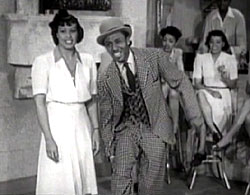 The duet continues with Slim & Edna Mae taking turns mouthing the lyrics. This is the strangest damned soundie because we're not hearing Slim's or Edna Mae's voices. The duet continues with Slim & Edna Mae taking turns mouthing the lyrics. This is the strangest damned soundie because we're not hearing Slim's or Edna Mae's voices.
They're lip-synching some white singers who are very generic-sounding. Edna Mae could certainly have done it better herself.
But the smiles are their own & at the instrumental break they turn in a reasonable dance routine. They're tapdancing their hearts out, though nobody bothered to record the sound of tapping, so as you watch it you'll have to add your own rapid Kalahari clicks.
It's slightly odd that there's a jump-cut to a line of girls seated at a counter showing lots of leg & watching the performance. Except the performance is staged as out in the street, not somewhere where there'd be a row of counter stools. Eventually we get an angle on them that shows it is indeed supposed to be a fastfood counter open to the street, but that first shot makes it look irrational.
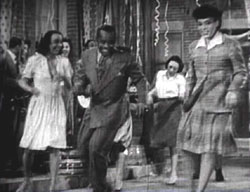 Block Party Revels (1943) is another of those soundies that could be called a dancie. Block Party Revels (1943) is another of those soundies that could be called a dancie.
Lynn Albritto is at an upright piano atop the sidewalk bandbox belting out a boogie beat, though she's miming her performance, as are her guitarist & two washtub bass players.
There are six members in her back-up band, called The Six Knobs, though we get a close-up of only three, & distant glimpse of another guitar player and a washboard percussionist. They are fewer in number and called The Four Knobs in Albritton's soundie Dispossessed Blues (1943).
MacGillivray & Okuda's The Soundies Book (revised 2007) insists the pianist is just miming a commercial record, but then they also thought Lynn was one of the dancers. If she was miming a commercial record, it was her own record, & anyhow, all soundies are mimed or lip-synced.
As a club performer, Lynn was one of the boogie-woogie virtuosoes of Harlem, right up there next to Meade Lux Lewis & Maurice Rocco, even if much less of her playing got recorded. She might be only a forgotten legend but for the meager sampling from the soundies. And that is, alas, a mite too little to assess her fairly.
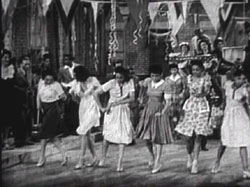 The street-party gathering is dancing outside a brownstone, starting with a highly acrobatic tapdancer, followed by two couples lindy-hopping. The street-party gathering is dancing outside a brownstone, starting with a highly acrobatic tapdancer, followed by two couples lindy-hopping.
Next up with the lion's share of the film, a choras line of six gals called The Harlem Cuties do a line dance that turns into the charleston.
They're not bad but they're not exceptional either, so I seriously doubt they're dancers from the Savoy such as appear in other soundies & are always phenomenal. The Harlem Cuties appear also in the Lynn Albritton soundie Back Stage Blues (1943), but I've a sneaking suspicion they were a trumped up troupe just for a couple soundies.
The Harlem Cuties back off the center of the street & are replaced by a dance team billed here as "Billy & Ann." They appear also in the soundie Poppin' the Cork (1943) with the Sepia Steppers. Although their fame did not extend far from Harlem, in the day Harlem was the place that mattered. They were regulars at the Savoy, which was the center of the world for great dancers.
They're charming as all get-out with their tap routine, closing the under-three-minute show for Block Party Revels. However, as with virtually all soundies with tapdancers, the tapping wasn't recorded. Even without the sound of tap their choreography is superb, not that they're working up a great sweat about it.
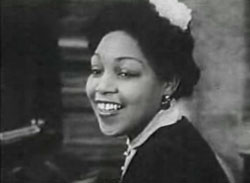 Lynn Albritto begins playing her upright piano even before she seats herself. She's playing Dispossessed Blues (1943) in her Sunday best, a flower in her hair, smiling & showing her gorgeous profile as though knowing perfectly well what a gosh darned beautiful woman she is.
Lynn Albritto begins playing her upright piano even before she seats herself. She's playing Dispossessed Blues (1943) in her Sunday best, a flower in her hair, smiling & showing her gorgeous profile as though knowing perfectly well what a gosh darned beautiful woman she is.
This is a direct prequel to Block Party Revels, as it shows how Lynn's piano got outside in the street for the party later that night. She's been evicted!
At first she has a sour look on her face, as who wouldn't, losing her apartment like that. But she sits at her piano & begins playing such a fine boogie woogie piece that she can't help but smile for the rest of the performance.
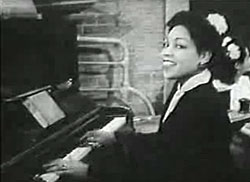 Though obviously shot the same day as Revels, the accompanyists for Dispossessed Blues are billed as The Four Knobs, rather than the Six Knobs as in Revels. Though obviously shot the same day as Revels, the accompanyists for Dispossessed Blues are billed as The Four Knobs, rather than the Six Knobs as in Revels.
So I guess more Knobs showed up for the revels later that night, though really we only ever see two of the Knobs clearly in this one (guitarist & washtub bassist). It's my guess the Knobs were a soundies invention, but if Lynn really did have a club act with washtub bassists in a little backlp-up band, what a shame more of that act wasn't preserved!
We see the guitarist sitting on the steps to the apartment accompanying . Then the neighborhood hepcats & frails start showing up to dance, the first couple is "Billy & Ann," followed by two other boogie dance couples.
As the tremendous piano continues uanbatted with its jump-blues boogie woogie splendiferousness, we see a washtub bass being set up in the background. More dancers arrive on the block, & the soundie fades out on the dancers.
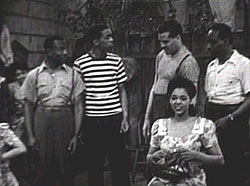 Babbling Bess (1943) has a bouncy commonplace beat that could've used a bit of Dixieland to improve it.
Babbling Bess (1943) has a bouncy commonplace beat that could've used a bit of Dixieland to improve it.
The black vocal group is The Chanticleers, with a few babes arrayed around them. Collectively they convey minimal charisma exchanging gazes with one another as they harmonize on the rather lame lyrics:
"You're talkin' all day, squawkin' all night/ Things that you say, you know it ain't right/ You don't know what you're talkin' about/ Lordy how the words fall out"; & "You moan & you mumble/ You groan & you grumble/ 'Bout things that been left on the shelf/" essentially an earlier take on the the 1950s Joe Jones novelty number "You talk too much you worry be to debt/ You talk too much you even worry our pet."
At the instrumental break one of the girls leaps up for a nice bit of dancing, then the Chanticleers finish their song of advice to the talkative Bess to "zip up your lip up."
Doubtless these guys were talented but this mediocre song doesn't capture them to great effect. They can also be seen in Jumpin' Jack from Hackensack (1943) & a couple other soundies all filmed around the same time.
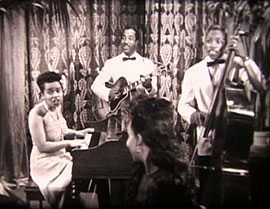 A thrilling trio, The Counts & the Countess, consist of the countess on piano, & the counts on guitar & double-bass.
A thrilling trio, The Counts & the Countess, consist of the countess on piano, & the counts on guitar & double-bass.
The trio is so smooth & marvelous that in spite of their lack of widespread lasting fame, one had to suppose they were well known in their day or in smaller circles.
I thought they were apt to be a club act from one of the lesser Harlem clubs, brought to the soundies studio by Fitz Pollard who was deeply invested in bringing black artists to the soundies & was directly responsible for many such acts being preserved on film.
But after a quick bit of research, the group got its start in jazz clubs of Detroit & Cleveland, became best known up & down the west coast at a time when there were jazz clubs everywhere from Denver to Seattle to San Diego.
They were also stars of radio shows, & indeed had a well deserved following "in their day." The trio broke up in 1948 & each member went on to luminous careers.
For Five Salted Peanuts (1945) the trio harmonizes gorgeously as they play the jump-jazz beat. The camera gives us excellent portraits of each performer in turn, as well as together. They're plauying against fancy drapes & some potted palms. To make it look like a club setting there's a couple tables set up with "patrons" seated attentively.
The pianist is Detroit native Alma Smith, who also played vibes. Her chief influences were Fats Waller, Art Tatum, & Nat King Cole. The King Cole Trio was the model for the Counts & the Countesses. Alma kept the title "Countess of Swing" for a long career.
The basist & tenor vocalist is Curtis Wilder, brother of trumpeter, composer, bandleader Joe Wilder, who performed with Duke Ellington & Louis Armstrong & many other giants. The guitarist is John Faire, who was later in the back-up band for the godfather of soul, James Brown.
The Carlie Abbott composition "Five Salted Peanuts" had been a hit for Tony Pastor & His Orchestra the same year it was filmed as a soundie by the Counts & the Countess. The lyrics begin:
"I put a penny in the slot/ And all I ever got/ Was five salted peanuts/ I put all my money in/ But don't ever win/ It's driving me nuts..." Alma gets a fine piano solo, & dominates the performance by her beauty & talent.
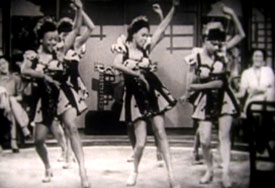 Miscredited as performed by "Black Dancing Girls in Nightclub Setting" under the improbable title "Girls, Girls, Girls," the soundie Dance Revels (1944) was included in the dvd compilation The Swing Years: Sweet Lorraine (2004).
Miscredited as performed by "Black Dancing Girls in Nightclub Setting" under the improbable title "Girls, Girls, Girls," the soundie Dance Revels (1944) was included in the dvd compilation The Swing Years: Sweet Lorraine (2004).
Dance Revels has the distinction of having been one of the over two-dozen soundies which the Kansas Board of Reviews censored as a threat to public morals.
Most of the censored soundies are rare because once they got on one state's censored list, the Mills Panoram company just stopped distributing them.
Mostly soundies evaded notice of the censors for which reason they really did push the envelope of propriety for the 'forties, & it was no coincidence that Panoram visual jukeboxes were also used in adults-only venues to present peepshows.
From today's perspective Dance Revels is not the least objectionable, but it's Kansas after all, & beautiful black girls in frilly undies could easily have given conniption fits to a racist honky values brigade.
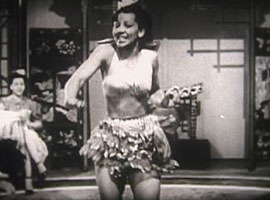 The soundie features a chorus line of beautiful African American gals, six in number, dancing quite nicely in their short-short skirts approximating French maid undergarments. The soundie features a chorus line of beautiful African American gals, six in number, dancing quite nicely in their short-short skirts approximating French maid undergarments.
The stage is likely supposed to represent a Harlem club, with a few customers seated at enarby tables.
At one point one girl dances alone in an even skimpier outfit, smiling up a storm.
This is Merrita Moore & the other gals were Her Dancing Darlings, probably a real Harlem, L.A., or Chicago club act of the era about whom little or nothing made it into the histories, & yet here they can be seen preserved after all.
Merrita doesn't really seem quite as talented as the other girls, but she put the act together so gets highlighted in a different costume for a solo dance performance.
At one of the tables are two hepcats & a frail with cocktails, dancing though sitting down. The jazz number seems to be on a xylophone but the recording isn't the best so might be a piano, with other instrumentation kept minimal & simple. It's a nice jumping tune, a mite generic is all.
Merrita our lone "star" dancer shuffles backward off the floor & the six choras gals return to dance their hearts out as this wee film is ending.
copyright © by Paghat the Ratgirl
|
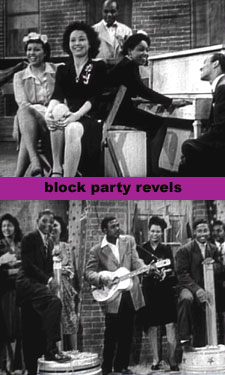

 The duet continues with Slim & Edna Mae taking turns mouthing the lyrics. This is the strangest damned soundie because we're not hearing Slim's or Edna Mae's voices.
The duet continues with Slim & Edna Mae taking turns mouthing the lyrics. This is the strangest damned soundie because we're not hearing Slim's or Edna Mae's voices.
 The street-party gathering is dancing outside a brownstone, starting with a highly acrobatic tapdancer, followed by two couples lindy-hopping.
The street-party gathering is dancing outside a brownstone, starting with a highly acrobatic tapdancer, followed by two couples lindy-hopping.
 Though obviously shot the same day as Revels, the accompanyists for Dispossessed Blues are billed as The Four Knobs, rather than the Six Knobs as in Revels.
Though obviously shot the same day as Revels, the accompanyists for Dispossessed Blues are billed as The Four Knobs, rather than the Six Knobs as in Revels.


 The soundie features a chorus line of beautiful African American gals, six in number, dancing quite nicely in their short-short skirts approximating French maid undergarments.
The soundie features a chorus line of beautiful African American gals, six in number, dancing quite nicely in their short-short skirts approximating French maid undergarments.